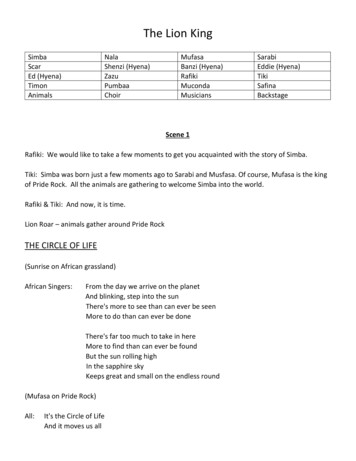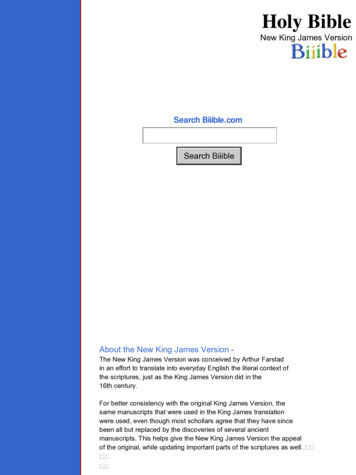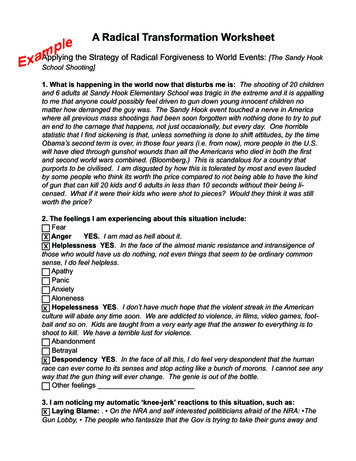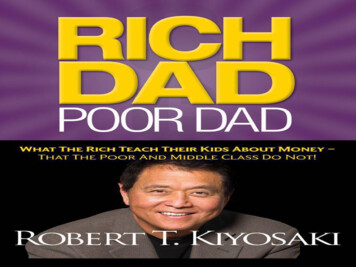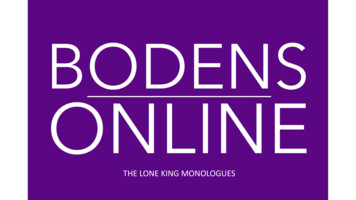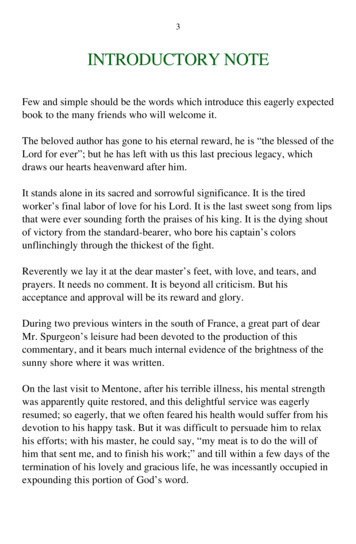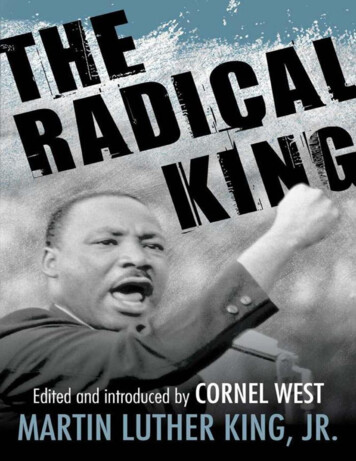
Transcription
THE RADICAL KINGMARTIN LUTHER KING, JR.Edited and introduced by CORNEL WESTBeacon Press, Boston
“As I have moved to break the betrayal of my own silences and tospeak from the burnings of my own heart . . . many persons havequestioned me about the wisdom of my path. At the heart of theirconcerns this query has often loomed large and loud: Why are youspeaking about the war, Dr. King? Why are you joining the voicesof dissent? Peace and civil rights don’t mix, they say. Aren’t youhurting the cause of your people, they ask? And when I hearthem, though I often understand the sources of their concern, I amnevertheless greatly saddened, for such questions mean that theinquirers have not really known me, my commitment or mycalling.”— Dr. Martin Luther King, Jr., remarks delivered atRiverside Church, New York, April 4, 1967
CONTENTSIntroduction: The Radical King We Don’t KnowPART ONERadical LoveIntroductionONE The Violence of Desperate MenTWO Palm Sunday Sermon on Mohandas K. GandhiTHREE Pilgrimage to NonviolenceFOUR Loving Your EnemiesFIVE What Is Your Life’s Blueprint?PART TWOProphetic Vision: Global Analysis and Local PraxisIntroductionSIX The World HouseSEVEN All the Great Religions of the WorldEIGHT My Jewish Brother!NINE The Middle East QuestionTEN Let My People GoELEVEN Honoring Dr. Du BoisPART THREEThe Revolution of Nonviolent Resistance: Against Empire and White SupremacyIntroductionTWELVE Letter from Birmingham JailTHIRTEEN Nonviolence and Social ChangeFOURTEEN My Talk with Ben Bella
Jawaharlal Nehru, a Leader in the Long Anti-Colonial StruggleSIXTEEN Where Do We Go from Here?SEVENTEEN Black PowerEIGHTEEN Beyond Vietnam: A Time to Break SilenceFIFTEENPART FOUROvercoming the Tyranny of Poverty and HatredIntroductionNINETEEN The Bravest Man I Ever MetTWENTY The Other AmericaTWENTY-ONE All Labor Has DignityTWENTY-TWO The Drum Major InstinctTWENTY-THREE I’ve Been to the MountaintopAcknowledgmentsNotesIndex
INTRODUCTIONTHE RADICAL KING WE DON’T KNOWThe FBI transcript of a June 27, 1964, phone conversation reveals Malcolm Xreceiving a message from Martin Luther King, Jr. This message supported theidea of getting the human rights declaration of the United Nations to expose theunfair, vicious treatment of black people in America. Malcolm X replied that hewas eager to meet Martin Luther King, Jr.—as soon as the next afternoon. If theyhad met that day and worked together, the radical King would be well known.In a speech to staff in 1966, King explained: “There must be a betterdistribution of wealth and maybe America must move toward a democraticsocialism.”1 If he had lived and pursued this project, the radical King would bewell known.On April 4, 1968, in Memphis—the last day of his life—Martin Luther King,Jr., phoned Ebenezer Baptist Church in Atlanta with the title of his Sundaysermon: “Why America May Go to Hell.” If he had preached this sermon, theradical King would be well known.Yet in Dr. King’s own time, he would say repeatedly, “I am neverthelessgreatly saddened . . . that the inquirers have not really known me, mycommitment, or my calling.”2 It is no accident that just prior to King’s death, 72percent of whites and 55 percent of blacks disapproved of his opposition to theVietnam War and his efforts to eradicate poverty in America.3 When much of theblack leadership attacked or shunned him, King replied, “What you’re sayingmay get you a foundation grant but it won’t get you into the kingdom of truth.”4In short, Martin Luther King, Jr., refused to sell his soul for a mess ofpottage. He refused to silence his voice in his quest for unarmed truth andunconditional love. For King, the condition of truth was to allow suffering tospeak; for him, justice was what love looks like in public. In King’s eyes, toomany black leaders sacrificed the truth for access to power or reduced sacrificiallove and service to selfish expediency and personal gain. This spiritual blackout
among black leaders resulted in their use and abuse by the white political andeconomic establishment that constituted a kind of “conspiracy against the poor.”This spiritual blackout—this lack of integrity and courage—primarily revealed adeep fear, failure of nerve, and spinelessness on behalf of black leaders. They toooften were sycophants, cheerleaders, or bootlickers for big monied interests,even as the boots were crushing poor and working people. In stark contrast tothis cowardice, King stated to his staff, “I’d rather be dead than afraid.”5Although much of America did not know the radical King—and too fewknow today—the FBI and US government did. They called him “the mostdangerous man in America.” They knew Reverend King was a revolutionaryChristian, sincere in his commitment and serious in his calling. They knew hewas a product of a black prophetic tradition, full of fire in his bones, love in hisheart, light in his mind, and courage in his soul. Martin Luther King, Jr., was themajor threat to the US government and the American establishment because hedared to organize and mobilize black rage over past and present crimes againsthumanity targeting black folk and other oppressed people.Any such black awakening can either yield hatred and revenge or love andjustice. This is why the prophetic words of Rabbi Abraham Joshua Heschel stillhaunt us: “The whole future of America will depend upon the impact andinfluence of Dr. King.”6 The fundamental question is: Does America have thecapacity to hear and heed the radical King or must America sanitize King inorder to evade and avoid his challenge?King indeed had a dream. But it was not the American dream. King’s dreamwas rooted in the American Dream—it was what the quest for life, liberty, andthe pursuit of happiness looked like for people enslaved and Jim Crowed,terrorized, traumatized, and stigmatized by American laws and Americancitizens. The litmus test for realizing King’s dream was neither a black face inthe White House nor a black presence on Wall Street. Rather, the fulfillment ofhis dream was for all poor and working people to live lives of decency anddignity.King’s dream of a more free and democratic America and world hadmorphed into, in his words, “a nightmare,” owing to the persistence of “racism,poverty, militarism, and materialism.” He called America a “sick society.” Atone point, King cried out in despair, “I have found out that all that I have beendoing in trying to correct this system in America has been in vain. I am trying toget at the roots of it to see just what ought to be done. The whole thing will haveto be done away with.”7 He said to his dear brother Harry Belafonte days before
his, King’s, death, “Are we integrating into a burning house?”8 He was weary ofpervasive economic injustice, cultural decay, and political paralysis. He was notan American Gibbon chronicling the decline and fall of the American empire buta courageous and visionary Christian blues man, fighting with style and love inthe face of the four catastrophes he identified, which are still with us today.Militarism is an imperial catastrophe that has produced a military-industrialcomplex and national security state and warped the country’s priorities andstature (as with the immoral drones dropping bombs on innocent civilians).Materialism is a spiritual catastrophe, promoted by a corporate-media multiplexand a culture industry that has hardened the hearts of hard-core consumers andcoarsened the consciences of would-be citizens. Clever gimmicks of massdistraction yield a cheap soulcraft of addicted and self-medicated narcissists.Racism is a moral catastrophe, most graphically seen in the prison-industrialcomplex and targeted police surveillance in black and brown ghettos renderedinvisible in public discourse. Arbitrary uses of the law in the name of the “war”on drugs have produced, in legal scholar Michelle Alexander’s well-knownphrase, a new Jim Crow of mass incarceration. And poverty is an economiccatastrophe, inseparable from the power of greedy oligarchs and avariciousplutocrats indifferent to the misery of poor children, elderly and disabledcitizens, and working people.The radical King was a warrior for peace on the domestic and globalbattlefields. He was a staunch anti-colonial and anti-imperial thinker and fighter.His revolutionary commitment to nonviolent resistance in America and abroadtried to put a brake on the escalating militarism running amok across the globe.As a decade-long victim of the vicious and vindictive FBI, King was a radicallibertarian as well as having closeted democratic socialist leanings. Hiscommitment to the precious rights and liberties for all was profound.For King, dissent did not mean disloyalty—in fact, dissent was a high formof patriotism. When he said that the US government was “the greatest purveyorof violence in the world today,”9 he was not trashing America. He was telling thepainful truth about a country he loved. King was never anti-American; he wasalways anti-injustice in America and anywhere else. Love of truth and love ofcountry could go hand-in-hand. Needless to say, under the policies of theNational Security Agency and Obama administration, King could have beensubject to detention without trial and assassination by executive decree (owing tohis links to “terrorists” of his day, such as Nelson Mandela).The radical King was a spiritual giant who tried to shatter the callousness
and indifference of his fellow citizens. Following his dear friend and comradeRabbi Abraham Joshua Heschel, King believed that indifference to evil is moreevil than evil itself. And materialism, with its attendants hedonism and egotism,produces sleepwalkers bereft of compassion and zombies deficient in love. Thisspiritual crisis is not reducible to politics or economics. It is rooted in the relativedecline of integrity, honesty, decency, and virtue, due in large part to the role ofbig money in American life. This coldhearted obsession with manipulation anddomination drives our ecological catastrophe-in-the-making and our possiblemilitary Armageddon.The radical King was a moral titan with profound allegiance to his roots—the black prophetic tradition and black freedom struggle. His genuinecommitment to the dignity of whites, as well as to peoples of all hues, neverovershadowed or downplayed his deep commitment to black people. For King,the struggle against the legacy of white supremacy was never a strategic move ortactical afterthought; rather, it was a profound existential and moral matter ofgreat urgency. King knew that white supremacy, in various forms, was a globalphenomenon. It remains shot through our hearts and minds, institutions andstructures, smart phones and unwise politicians. The modes of racist domination—from barbaric slavery to bestial Jim Crow, Sr., to cruel Jim Crow, Jr.—arenever reducible to individual prejudice or personal bias. Empire, whitesupremacy, capitalism, patriarchy, and homophobia are linked in complex ways,and our struggles against them require moral consistency and systemic analyses.The radical King was a democratic socialist who sided with poor andworking people in the class struggle taking place in capitalist societies. Thisclass struggle may be visible or invisible, manifest or latent. But it rages on in afight over resources, power, and space. In the past thirty years we have witnesseda top-down, one-sided class war against poor and working people in the name ofa morally bankrupt policy of deregulating markets, lowering taxes, and cuttingspending for those who are already socially neglected and economicallyabandoned. America’s two main political parties, each beholden to big money,offer merely alternative versions of oligarchic rule. The radical King was neitherMarxist nor communist, but he did understand the role of class analysis in hisfocus on poor and working people. He always had a healthy suspicion of allpoliticians—of any color—owing to his critique of legalized bribery andnormalized corruption in money-saturated American politics. He noted, “I havecome to think of my role as one which operates outside the realm of partisanpolitics. . . . I feel I should serve as a conscience of all the parties and all of the
people.”10 This critical attitude toward politicians was deepened when heworked to register thousands of people to elect the first black mayor in moderntimes, Carl Stokes, in Cleveland in 1967, yet was uninvited to join the stage forthe victory celebration.Needless to say, the rich legacy of the radical King in the age of Obamacelebrates the symbolic breakthrough of a black president and keeps track of theright-wing backlash against him. Yet the bailout for banks, record profits forWall Street, and giant budget cuts on the backs of the vulnerable rather thanmortgage relief for homeowners, jobs with a living wage, and investment ineducation, infrastructure, and housing reveal the plutocratic domination of theObama administration. The dream of the radical King for the first blackpresident surely was not a Wall Street presidency, drone presidency, andsurveillance presidency with a vanishing black middle class, devastated blackworking class, and desperate black poor people clinging to fleeting symbols andempty rhetoric.I shall never forget the first question I asked Barack Obama when he calledto solicit my support: “What is the relation of your presidential policies to thelegacy of Martin Luther King, Jr.?” He replied—in hours of dialogue—that therelation was strong. And I agreed to lend critical support. After sixty-five events,from Iowa to Ohio, in 2008, I knew that most of his advisers were not part of theKing legacy. And Obama’s betrayal of what the radical King stands for becameundeniable.Sadly, the damage done by Obama apologists—often for money, access, andstatus—is immeasurable and nearly unforgivable. For the first time in Americanhistory, black citizens are the most prowar in American society. Black churchesare among the weakest in prison ministry—even given the disproportionatelyhigh percentage of black prisoners. Black schools are under attack fromprofiteering enterprises. Forty percent of black children live in poverty.11 Asidefrom a few exceptions, black musicians are more and more marginal in popularculture. Black deaths, especially among young people, are out of control. Inother words, the Obama apologists who hide and conceal Wall Street crimes,imperial crimes, new Jim Crow crimes, and surveillance lies in order to protectthe first black president have much to account for. And a health-care bill—abonanza for big insurance and drug companies alongside access to newconsumers—falls far short of the mark.The response of the radical King to our catastrophic moment can be put inone word: revolution—a revolution in our priorities, a re-evaluation of our
values, a reinvigoration of our public life, and a fundamental transformation ofour way of thinking and living that promotes a transfer of power from oligarchsand plutocrats to everyday people and ordinary citizens.The radical King was first and foremost a revolutionary Christian—a blackBaptist minister and pastor whose intellectual genius and rhetorical power wasdeployed in the name of the Gospel of Jesus Christ. King understood this goodnews to be primarily radical love in freedom and radical freedom in love, afallible enactment of the Beloved Community or finite embodiment of theKingdom of God.King’s radical love can be heard in John Coltrane’s “A Love Supreme” or theIsley Brothers’ “Caravan of Love.” This radical love of an intensely hated peopleis both liberating and contagious, just as this radical freedom of a thoroughlyunfree people is both emancipating and infectious.The radical King was the most significant and effective organic intellectualin the latter half of the twentieth century whose fundamental motif was radicallove. King’s radical love was Christocentric in content and black in character.Like the Christocentric language of the Black Church that produced the radicalKing—Jesus as the Bright and Morning Star against the backdrop of the pitchdarkness of the night, as water in dry places, a companion in loneliness, a doctorto the sick, a rock in a wearied land—his Christocentrism exemplifies theintimate and dependent relationship between God and person and between Godand a world-forsaken people. The black character of King’s radical love was itsroots in the indescribable terror and inimitable trauma of being black in whitesupremacist America, during slavery, Jim Crow, Sr., or Jim Crow, Jr.King’s work and witness is a kind of prophetic pneumatology in motion—akinetic orality, passionate physicality, and combative spirituality that weddedmind to movement, soul to sustenance, and body to empowerment. Like his mostworthy theological precursor, Howard Thurman, King pulled from the richinsights of Western thinkers, yet he elevated the lived experiences of wounded,scarred, and bruised bodies of enslaved and Jim-Crowed black peoples to enactradical love.King’s radical love put a premium on artistic performance and existentialpraxis. His sermons were performances that authorized an alternative reality tothe way the world is. His living radiated a radical tenderness, subversivesweetness, and militant gentleness. He found great joy in serving others.Like his great contemporary Dorothy Day, the Catholic saint who looked atthe world through the lens of her heart, Dr. King understood radical love as a
form of death—a relentless self-examination in which a fearful, hateful, egoisticself dies daily to be reborn into a courageous, loving, and sacrificial self. Forboth Day and King, this radical love flows from an imitation of Christ, aresponse to an invitation of self-surrender in order to emerge fully equipped tofight for justice in a cold and cruel world of domination and exploitation. Thescandal of the Cross is precisely the unstoppable and unsuffocatable love thatkeeps moving in a blood-soaked history, even in our catastrophic times. There isno radical King without his commitment to radical love.This book unearths a radical King that we can no longer sanitize. Hisrevolutionary witness—embodied in anti-imperial, anti-colonial, anti-racist, anddemocratic socialist sentiments—was grounded in his courage to think, hiscourage to love, and his courage to die. Could it be that we know so little of theradical King because such courage defies our market-driven world?
PART ONERADICALLOVE
Dr. Martin Luther King, Jr., pulls up a cross that was burned on the front lawn of his home on April 26,1960. To his left stands his son Martin Luther King III, aged two.
RADICAL LOVE sits at the center of the radical King. All the individual success, professionalachievement, sharp analysis, and strategic calculation are but sounding brass and tinkling symbolwithout radical love. For King, radical love emerges from catastrophe, perseveres through crisis,and yields an indomitable spiritual center—a radical humility and radical integrity.In this collection’s first essay, “The Violence of Desperate Men,” we see the source of King’sradical love: his spiritual mountaintop experience in his kitchen in Montgomery, Alabama, just ashe assumes leadership of the Montgomery Improvement Association. Following the pioneeringwork of David Garrow, James Cone, and Vincent Harding, I understand the radical King as aspiritual warrior equipped with Christian armor willing to love, serve, and die for his people.Radical love requires the cowardly self to die in order for the courageous self to live—daily. Thisdeath-in-life conversion sustains the self in the face of terror and trauma. King’s kitchenexperience is a kind of 9/11 moment—he and his precious family are unsafe, unprotected, subjectto random violence, and hated for who he and they are. These 9/11 moments are integral to beingblack in America. King’s loving parents, Martin and Alberta King, and supportive church andschool, Ebenezer Baptist Church and Morehouse College, laid his strong foundations. But thelove he received from them was radicalized—dipped in the dark pit of catastrophe and tested inthe fierce fire of crisis—in Montgomery. His spiritual call for help came in the form of God’s radicallove for him.The major intellectual and practical challenge to King’s radical love came from the critiques ofreligion put forward by Karl Marx and Friedrich Nietzsche. King spent much time wrestling withthese figures in his studies and in his life. Marx’s claim was that religion was the opiate of thepeople—the instrument of those who rule in that it disinvests people of their own powers byinvesting God with all power and thereby rendering them submissive and deferential toward thestatus quo.Nietzsche’s view of Christian love as a form of resentment and revenge of the powerless andimpotent toward the powerful and the strong led King briefly to “despair of the power of love insolving social problems.”1 Prophetic religion could empower people to fight against oppressionand struggle for freedom—so Marx was only partly right. But could the love ethic of Jesus Christbe applied to groups, nations, or classes as well as to individuals? The Gandhian method of lovemotivated (agapic) nonviolent resistance provided the radical King with a response to Marx andan answer to Nietzsche. Radical love was a moral and practical method—a way of life and a wayof struggle in which oppressed people could fight for freedom without inflicting violence on theoppressor, humiliating the opponent, and hence, possibly transforming the moral disposition ofone’s adversary.King’s radical love—following Gandhi’s great breakthrough—is often celebrated for his love ofwhite oppressors. This misses the point. King’s radical love of an often unloved people—blackpeople—is the basis of his much-heralded love of white people. His radical love is inseparablefrom the radical freedom he wants for an unfree people—and for all others. A fuller discussion ofKing’s radical love requires a comparative analysis of Malcolm X’s radical love or Ella Baker’sradical love—just as Gandhi’s radical love should be contrasted with Ambedkar’s radical love.
King’s two sermons “Palm Sunday Sermon on Mohandas K. Gandhi” and “Loving YourEnemies,” as well as his autobiographical “Pilgrimage to Nonviolence,” lay bare his profound andpoignant hammering out the idea and practice of radical love.King was deeply concerned with bequeathing the rich tradition of radical love to the youngergeneration. He understood the deep insights of the Black Nationalist heritage, represented bygiants such as Marcus Garvey and Malcolm X, who highlighted black self-respect, black selfdefense, and black self-determination. He also knew that his Southern Christian style did notalways resonate with Northern urban youth. Yet King always extended his radical love to them—ina sincere and authentic way. In his speech to high school students in Philadelphia, we seeanother side of King: a love warrior focused on fostering black self-love in youth. Based on myown teaching, including work in high schools and prisons, I decided to end part 1 with King’s morepersonal and intimate directive to black youth and their future.
ONETHE VIOLENCE OF DESPERATE MENThe following is a chapter from Dr. King’s memoir of the Montgomery bus boycott, StrideToward Freedom (1958), which King described as “the chronicle of 50,000 Negroes whotook to heart the principles of nonviolence, who learned to fight for their rights with theweapon of love, and who, in the process, acquired a new estimate of their own humanworth.”After the “get-tough” policy failed to stop the movement the diehards becamedesperate, and we waited to see what their next move would be. Almostimmediately after the protest started we had begun to receive threateningtelephone calls and letters. Sporadic in the beginning, they increased as timewent on. By the middle of January, they had risen to thirty and forty a day.Postcards, often signed “KKK,” said simply “get out of town or else.” Manymisspelled and crudely written letters presented religious half-truths to provethat “God do not intend the White People and the Negro to go to gather if he didwe would be the same.” Others enclosed mimeographed and printed materialscombining anti-Semitic and anti-Negro sentiments. One of these contained ahandwritten postscript: “You niggers are getting your self in a bad place. TheBible is strong for segregation as of the jews [sic] concerning other races. It iseven for segregation between the 12 tribes of Israel. We need and will have aHitler to get our country straightened out.” Many of the letters were unprintablecatalogues of blasphemy and obscenity.Meanwhile the telephone rang all day and most of the night. Often Corettawas alone in the house when the calls came, but the insulting voices did notspare her. Many times the person on the other end simply waited until weanswered and then hung up.A large percentage of the calls had sexual themes. One woman, whose voiceI soon came to recognize, telephoned day after day to hurl her sexual accusations
at the Negro. Whenever I tried to answer, as I frequently did in an effort toexplain our case calmly, the caller would cut me off. Occasionally, we wouldleave the telephone off the hook, but we could not do this for long because wenever knew when an important call would come in.When these incidents started, I took them in stride, feeling that they were thework of a few hotheads who would soon be discouraged when they discoveredthat we would not fight back. But as the weeks passed, I began to see that manyof the threats were in earnest. Soon I felt myself faltering and growing in fear.One day, a white friend told me that he had heard from reliable sources thatplans were being made to take my life. For the first time I realized thatsomething could happen to me.One night at a mass meeting, I found myself saying: “If one day you find mesprawled out dead, I do not want you to retaliate with a single act of violence. Iurge you to continue protesting with the same dignity and discipline you haveshown so far.” A strange silence came over the audience.Afterward, to the anxious group that gathered around, I tried to make light ofthe incident by saying that my words had not grown from any specific cause, butwere just a general statement of principle that should guide our actions in theevent of any fatality. But Ralph Abernathy was not satisfied. As he drove mehome that night, he said:“Something is wrong. You are disturbed about something.”I tried to evade the issue by repeating what I had just told the group at thechurch. But he persisted.“Martin,” he said, “you were not talking about some general principle. Youhad something specific in mind.”Unable to evade any longer, I admitted the truth. For the first time I told himabout the threats that were harassing my family. I told him about theconversation with my white friend. I told him about the fears that were creepingup on my soul. Ralph tried to reassure me, but I was still afraid.The threats continued. Almost every day someone warned me that he hadoverheard white men making plans to get rid of me. Almost every night I went tobed faced with the uncertainty of the next moment. In the morning I would lookat Coretta and “Yoki” and say to myself: “They can be taken away from me atany moment; I can be taken away from them at any moment.” For once I did noteven share my thoughts with Coretta.One night toward the end of January I settled into bed late, after a strenuousday. Coretta had already fallen asleep and just as I was about to doze off the
telephone rang. An angry voice said, “Listen, nigger, we’ve taken all we wantfrom you; before next week you’ll be sorry you ever came to Montgomery.” Ihung up, but I couldn’t sleep. It seemed that all of my fears had come down onme at once. I had reached the saturation point.I got out of bed and began to walk the floor. Finally I went to the kitchen andheated a pot of coffee. I was ready to give up. With my cup of coffee sittinguntouched before me I tried to think of a way to move out of the picture withoutappearing a coward. In this state of exhaustion, when my courage had all butgone, I decided to take my problem to God. With my head in my hands, I bowedover the kitchen table and prayed aloud. The words I spoke to God that midnightare still vivid in my memory. “I am here taking a stand for what I believe is right.But now I am afraid. The people are looking to me for leadership, and if I standbefore them without strength and courage, they too will falter. I am at the end ofmy powers. I have nothing left. I’ve come to the point where I can’t face italone.”At that moment I experienced the presence of the Divine as I had neverexperienced Him before. It seemed as though I could hear the quiet assurance ofan inner voice saying: “Stand up for righteousness, stand up for truth; and Godwill be at your side forever.” Almost at once my fears began to go. Myuncertainty disappeared. I was ready to face anything.Three nights later, on January 30, I left home a little before seven to attendour Monday evening mass meeting at the First Baptist Church. A member of mycongregation, Mrs. Mary Lucy Williams, had come to the parsonage to keep mywife company in my absence. After putting the baby to bed, Coretta and Mrs.Williams went to the living room to look at television. About nine-thirty theyheard a noise in front that sounded as though someone had thrown a brick. In amatter of seconds an explosion rocked the house. A bomb had gone off on theporch.The sound was heard many blocks away, and word of the bombing reachedthe mass meeting almost instantly. Toward the close of the meeting, as I stood onthe platform helping to take the collection, I noticed an usher rushing to giveRalph Abernathy a message. Abernathy turned and ran downstairs, soon toreappear with a worried look on his face. Several others
phrase, a new Jim Crow of mass incarceration. And poverty is an economic catastrophe, inseparable from the power of greedy oligarchs and avaricious plutocrats indifferent to the misery of poor children, elderly and disabled citizens, and working people. The radical King was a w

